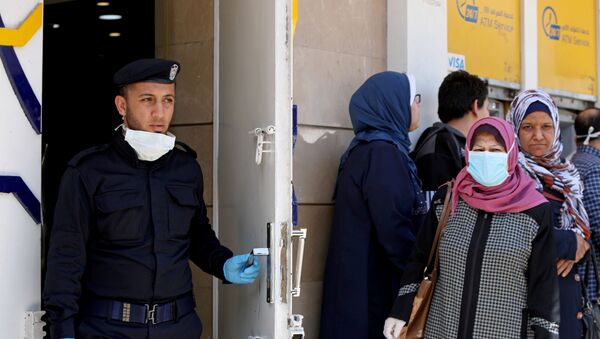“Testing at our central laboratory has stopped, after coronavirus test kits completely ran out,” Ashraf al-Qidra, a spokesman for the Hamas-run health ministry, said on Wednesday, as reported by Reuters.
Gaza’s current inability to test for the virus severely hinders the enclave’s attempt at slowing COVID-19’s spread among its nearly 2 million inhabitants. A widespread lockdown has not been imposed, but Hamas has banned large street gatherings and closed Gaza’s schoolhouses, wedding halls and mosques.
According to Hamas interior ministry spokesman Eyad Al-Bozom, authorities “will not hesitate to impose a curfew if we have to … We are taking necessary decisions in accordance with our daily evaluation."
Hamas officials have maintained that the current health condition of Gaza does not warrant a total lockdown - which would negatively impact the impoverished enclave’s economy and the people’s earning power.
A mere 13 cases of the novel coronavirus have been confirmed throughout Gaza, and the infected individuals have been ordered to quarantine. As a point of comparison, the Israeli-occupied West Bank has approximately 250 COVID-19 cases and a single related death.
Those critical of Hamas’ refusal to impose regular movement restrictions argue that low stocks of necessary medical supplies and the absence of test kits to identify carriers of the virus will promote its spread, creating a crisis Gaza is unable to handle.
The Palestinian Center for Human Rights issued a news release on Wednesday highlighting Gaza’s “acute shortage of essential drugs, medical disposables, ventilators, and COVID-19 testing kits.” The center warned that an outbreak could mean the “collapse of the health sector in the Gaza Strip.”
The Palestinian Authority and the World Heallth Organization have previously supplied Gaza’s health officias with supplies.
BGI Group, a genome-sequencing company based out of southern China, and Israeli genome-testing company AID GENOMICS announced on Monday that they were in the process of setting up a laboratory that will process around 3,000 novel coronavirus tests per day for Palestinians living in the West Bank and Gaza, though the location of the lab remains unknown, reported the Times of Israel.
“The worst of times reveals the best in people, [and] saving lives is of paramount importance,” BGI CEO Dr. Ye Yin said. “We must work together to surmount whatever difficulty that lies ahead.”


